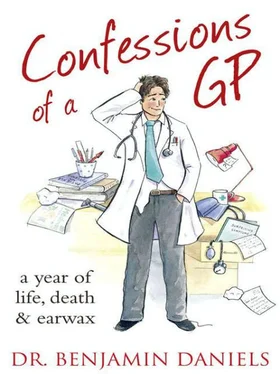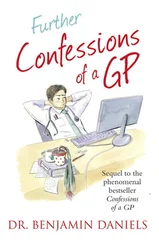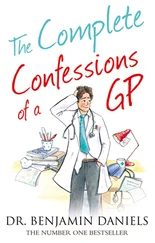4. Be attractive . When I was working in A&E, the orthopaedic surgeons were famous for avoiding seeing patients at any cost. The only time we ever saw them demonstrate any degree of enthusiasm about their chosen profession was when a particularly beautiful dance student injured her knee. I’m sure she didn’t really need admitting but they insisted that they kept a close eye on her on the ward for a few days.
5. Have a truly embarrassing problem . It must be awful to have to tell your doctor that you have an object stuck up your bottom, but if it is any consolation, it will absolutely make your doctor’s day. For me, the icing on the cake is always the ridiculous accompanying explanation: ‘So I was trying to save water by washing the vegetables while also taking a shower and then I slipped and what are the chances of landing on that courgette…’
I am proud to say that I do listen and show interest in my patients because I still maintain enthusiasm for my job. This is not because my day-to-day work in general practice is on the cutting edge of medical science, but because I have a genuine interest in the people and the stories behind the science of the illnesses. Of course, quite rightly when you are ill or injured, you have absolutely no reason to give two monkeys’ whether your condition holds any academic curiosity or entertainment value to the doctor you’re seeing – and why should you? Just one thing, though, if at the end of a long surgery you are 15 minutes through a monologue describing the detailed chronology of your athlete’s foot, don’t be overly offended if your doctor’s eyes glaze over somewhat.
If you get a bunch of GPs in a room together, it won’t be long before they start moaning about their jobs. This never ceases to amaze me, as I think we have it fairly good at the moment. We are paid well, work good hours and have an interesting and rewarding occupation. Despite this, GPs spend a great deal of time complaining about almost everything. I even heard a couple of GP partners complaining about how high their tax bill was going to be this year. I couldn’t help but point out that if they were going to earn 120K, then they couldn’t really expect any sympathy for paying a bit more to the treasury come April!
Some of my older patients reminisce fondly about the time when their own GP was on call 24 hours a day and was always on hand for an emergency visit. My uncle was one of those GPs. He would disappear from family dinners to deliver a baby, get home at 5 a.m. and then start morning surgery at 8 a.m. with a huge line of patients queuing out into the street. There is a wonderfully romantic, old-fashioned idea about that bygone time of the loyal and dedicated family GP. My auntie still has her late husband’s ex-patients stopping her in the street and telling her what a wonderful doctor he was. My uncle had no life outside of his work and rarely spent any time with his family. He missed his children growing up and dropped down dead shortly after retiring. I wouldn’t want to have had his life. My generation of young GPs is mostly much better at finding a balance between work and home life. I’m sorry that my patients have to see a GP they don’t know if they need a doctor on a Sunday night or while I’m on holiday, but I have a life too.
All in all, I’m quite positive about the future of general practice. There are always scaremongering stories about big supermarket chains setting up surgeries and shipping in lots of Eastern European doctors to take over our jobs. I think this is unlikely. Yes, patients grumble about struggling to get through on the phone or their doctor running late, but individually most GPs are quite well liked and valued by their patients. My experience of patients is that they are a fairly loyal bunch. I’m not sure that a huge number would be lured away to Tesco if they opened surgeries at the back of their stores. I can see that some would be attracted by the convenience of supermarket doctors, especially if they ran a 24-hour service, but ultimately most patients like the familiarity and friendliness of their local practices. Although there is a lot of potential profit to be made out of running GP surgeries, there is also a hell of a lot of red tape and hoops to jump through. I’m not sure whether Tesco would really want the bother. I may eat my words someday but I think that our jobs and future are fairly secure.
I found my first few consultations with Tariq frustrating. I struggled to understand his English and he never seemed to have much physically wrong with him. The consultations were always a bit disjointed and he always seemed reluctant to leave. Another wasted consultation, I would think to myself as he finally left my room.
Gradually, after his first few visits, Tariq began to open up to me. He was in his mid-twenties and had been tortured in a Sudanese jail after being arrested for political activity at his university. He had arrived here hidden in a lorry and was currently seeking asylum. He lived in a homeless hostel with mostly alcoholics and heroin addicts and spent his days aimlessly wandering the streets of the town centre. He was the sort of person I might walk past every day without noticing, but behind the sad tired face was a brilliant mind and a man desperate to work, study and make the most out of his life. Unfortunately, because of his asylum-seeking status, he was not entitled to do any of this. Instead, he looked enviously at the alcoholics and junkies that he lived with, knowing that as British citizens, if they so wished they could work, study and do many things that he was not entitled to do. Despite being understandably miserable here, Tariq was terrified that he would be tortured and killed if he returned to the Sudan, so he was stuck between an unpleasant rock and a horrifying hard place.
After his third or fourth visit, Tariq confessed to me that in the space of a whole week I was the only person he spoke to. If I wasn’t a GP, I would not believe that in a busy cosmopolitan city a man could spend weeks passing the time without conversing with a single soul. Most people avoid seeing their doctor if they possibly can, but for Tariq, I was his only outlet to the rest of the world. I was the only person to whom he could talk about his feelings or even make small talk about the weather. In between my consultations with Tariq I spoke to many hundreds of people. I talked to work colleagues, friends and family, even the monosyllabic blokes I play football with. Tariq talked to no one. This must be torture for an intelligent, articulate and sociable young man.
In the soap opera that was Tariq’s life, I was not just a walk-on part or an insignificant extra. For Tariq, I was the only other character in this episode of his life and was really quite important to him. Tariq had absolutely nothing physically wrong with him, yet my role as his doctor was vital and unique. He trusted me and I listened to his problems. He confided in me awful things that happened to him in his past and, more mundanely, I helped him fill out forms to aid his housing and finances. Helping Tariq wasn’t putting my medical degree and years of training to great use, but my title as doctor and the ability of the NHS to make me available free of charge enabled me to reach out to another human and make a huge difference to his life. I have stopped grumbling that I’m overqualified to help someone fill in a form and instead appreciate the honour and privilege it is to be able to call myself a doctor working in the front line for the NHS.
It was my first night as a medical student on the delivery suite and I was excited at the prospect of helping to bring a new life into the world. To my horror, the first baby I saw was the lifeless body of a stillborn. I had stayed away from the traumatic birth but the whole unit could hear the dead infant’s mother wailing in grief as she pushed out her stillborn child. The midwife asked me to keep her company as she cleaned and dressed the body before it was taken down to the morgue. I can still clearly remember looking down at him. His features were perfect but his lips were almost completely black and the rest of his body a shade of dark purple. He had never had the chance to breathe in oxygen and turn pink. The pregnancy had apparently been normal and the baby was a healthy size. Mum was two weeks past her due date and as she and Dad eagerly anticipated the onset of labour, their baby just stopped moving. A scan confirmed that the heart was no longer beating. The devastated mum went into labour knowing that her son had already died.
Читать дальше
Конец ознакомительного отрывка
Купить книгу











![Benjamin Franklin - Memoirs of Benjamin Franklin; Written by Himself. [Vol. 2 of 2]](/books/747975/benjamin-franklin-memoirs-of-benjamin-franklin-wr-thumb.webp)
![Benjamin Franklin - Memoirs of Benjamin Franklin; Written by Himself. [Vol. 1 of 2]](/books/748053/benjamin-franklin-memoirs-of-benjamin-franklin-wr-thumb.webp)